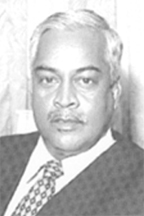-but final decision rests with Home Affairs Minister
By Iana Seales
Government yesterday passed an amendment to the Fugitive Offenders Act 1988 to correct a lacuna in the local extradition laws and it has controversially included a provision which empowers the Home Affairs Minister to decide whether to extradite or not.
The debate on the amendment was confined to the government benches and the Alliance For Change (AFC) following a boycott of yesterday’s sitting by the PNCR. AFC member Khemraj Ramjattan fiercely criticized the new modifications calling government’s action an erroneous procedure to correct a treaty which “simply required a section being removed”.


bill, Fugitive Offenders (Amendment) Bill 2009, seeks to address a conflict that arose within the law regarding individuals here being extradited, an issue which came into sharp focus back in 2008 when the United States was seeking Guyanese Barry Dataram for cocaine smuggling offences. The US was unable to secure Dataram’s provisional arrest because the extradition treaty between Guyana and the US contains a proviso which allows the US to extradite to third countries, clashing with the provisions of the Fugitive Offenders Act, which says “no one shall be extradited or kept in custody for the purpose of extradition from Guyana to another country unless provision has been made by that Commonwealth or treaty- country for ensuring that they would not be extradited to a third country for trial of any offence without the consent of the minister.” As a result, extraditions to the US have been on hold awaiting a new agreement or an amendment of the law.
The recent attempts to extradite Dataram, for whom an extradition request was made by the US, were stalled by a court ruling which exposed the lacuna in the law. But this is no longer the case, Attorney General Charles Ramson said yesterday, as he moved the bill in the House. He said the amendments represent a suitable formula which was worked out following extensive internal consultations as the administration considered it critical to have some residual discretion lie within the power of the subject minister. “….this government is not trying to give some reason for a man like Dataram to have escaped,” he added while insisting that the amendments have modernized the law.
Ramson referred to two specific court judgments on the issue, one last year by the Full Court and the other back in 1992 by the Appeal Court, saying that the Full Court’s ruling startled the judicial community since there was no precedent for Dataram’s application to be dealt with in accordance with the rules of the High Court. The objective of the amendment is to prevent the continued rush to litigation, Ramson said, noting that the changes are meant to clarify the law on extradition.
“Here we are nearly one year after when Dataram has already flown the coop, as I am advised, and who would blame him? Had we been in the same position we might have flown the coop too,” Ramson said yesterday. He argued that people are being tried in the press even before they are tried in court and referred to Roger Khan saying the confessed drug trafficker must be glad his ordeal is over, claiming, “He has got his 15 years and the media has dropped him like a hot potato.
“They even spent money running from Guyana to the United States, bitter cold you see them shivering and asking questions,” he continued as he spoke about the local media who had attended the sentencing of Khan in New York. To this, someone shouted, “Relevance!”
Ramjattan criticized the bill saying the truth behind its move to the National Assembly was being concealed by the administration, a suggestion which was angrily rejected by the AG and his colleagues on the government benches and resulted in a furore which was subsequently quelled when Ramjattan withdrew the comment.
Speaker of the House, Ralph Ramkaran upbraided the AFC Chairman over the remark saying it was tantamount to him stating that the Attorney General stood up and lied in the House.
“…there are a lot of withdrawals which I will have to make today,” Ramjattan said as he continued his debate on the issue. The response to this statement by a heckler on the government benches was, “Better you withdraw ya self”. Ramjattan’s criticisms shifted to focus on the provision which allows for ministerial discretion and he roundly condemned it. He said the Minister of Home Affairs should not be allowed to “cherry-pick” on an important issue such as extradition and he contended that it is not likely any high ranking government official if ever accused would be extradited should a request is made.
The AFC Chairman sought to explain that his objections to the bill do not “in any way support the Barry Datarams of this world”. He said the alleged drug trafficker who was released following court rulings should have been extradited a long time ago, adding that the administration didn’t need to wait until some amendment was made.
Ramjattan created another ruckus in the house when he lambasted the AG for attacking the decision of the courts on the issue, particularly the decision of Chief Justice (ag) Ian Chang who sat in the Full Court. Ramson had stated in his presentation that the Full Court was the source of the kind of problems faced by the administration on extradition. He noted that there were no appeal review procedures available against the ruling in the Dataram case from the Full Court to the Court of Appeal.
Ramson, agitated and on his feet, called on the Speaker to offer him protection from the attacks saying if this was not afforded he would be take on Ramjattan. He then said that the AFC Chairman was not worthy of his attention and referred to Ramjattan as a “little boy who should show me respect”.
The explanatory memorandum of the bill passed points to it enabling government to extradite fugitive offenders in the interest of justice. Persons being extradited are not allowed to complain as stated in the new law, but their fate also falls within the discretion of the Home Affairs Minister.
Following the decision of the Guyana court in the Dataram case in December 2008, the government said that the extradition laws required modernization.

